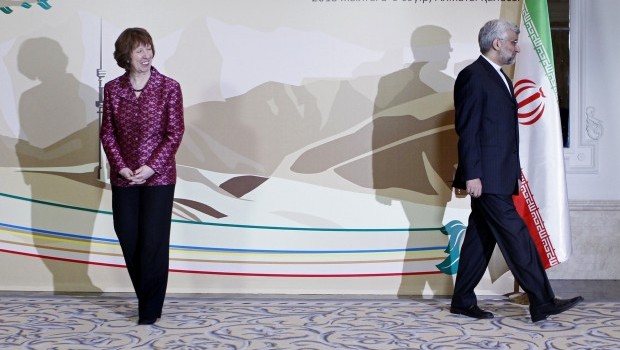
EU foreign policy chief Catherine Ashton, left, smiles, as Saeed Jalili, secretary of Iran’s Supreme National Security Council walks away, after they posed for press in Almaty, largest Kazakhstan’s city on Friday, April 5, 2013 (AP Photo/ Shamil Zhumatov, pool)
After the success of the previous talks in Almaty in February (which Iran’s chief nuclear negotiator, Saeed Jalili, described as a “turning point”), P5+1 officials had been hopeful that the latest talks would yield tangible results. They were to be disappointed. The two sides were far apart in both their expectations and their goals. For the P5+1, the crux of the matter continues to be that Iran must prove it is not developing a nuclear bomb: it is, therefore, essential that it suspend its 20% uranium enrichment, which involves most of the energy required to enrich to weapons-grade levels. They also believe that Iran must suspend enrichment work at its Fordo plant, although this a climbdown from the original demand that the plant be shut down.
For Iran, the goal is to extract “objective guarantees” from the P5+1 about its right to enrich uranium. Everything else is secondary. Indeed, what Iran reportedly requires to suspend 20% enrichment is the lifting of all unilateral sanctions. No surprise, then, that according to a US official the intensive discussions had revealed a “significant gulf” between the two sides in a crisis that has been deadlocked for years.
Even the Russians (the closest thing Iran has to an ally in the nuclear crisis), normally so quick to give Iran the benefit of the doubt and keen to keep negotiations going, were stumped. Russian Deputy Foreign Minister Sergei Ryabkov could only gloomily confirm that there had been a “lack of results.”
Iran, meanwhile, seemed more concerned with playing to a domestic audience as Jalili, speaking at a press conference on Saturday, declared that “The Islamic Republic of Iran has announced on numerous occasions—stressing the rights of the Iranian people, including the right to enrich, and an end to behaviors which are a sign of enmity towards the people of Iran [read: the sanctions] based on these two points.”
A sign of the P5+1’s deep frustration was that despite Iran’s eagerness to schedule a new meeting, it was not yet prepared to arrange more negotiations. In the words of one official, there will be no “talks for talks’ sake.”
It was not all negative. Dialogue between the two sides was reportedly greater than ever before, with some officials remarking that the level of exchange between the two sides was unprecedented in over a decade of nuclear negotiations with Iran. Critically, the two most important players in this drama—the Iranians and Americans—spoke directly for over half an hour.
But it is not enough. In fact, the most obvious result of the talks was most likely to strengthen longstanding suspicions in Israel—which threatens military strikes against Iran’s nuclear facilities to stop it from getting the bomb—that Iran is using diplomacy as a stalling tactic. “The Iranians are using this round of talks to pave the way to a nuclear bomb,” said Israel’s strategic affairs minister, Yuval Steinitz, who also urged more robust diplomatic stance to make it “unequivocally clear to the Iranians that the negotiation games are finished.”
To make matters worse, the talks were held against a backdrop of growing international tensions with North Korea, which, like Iran, is defying international demands to curb its nuclear program—and has carried out three nuclear tests since 2006. With mounting pressure from both Israel and events elsewhere, the P5+1’s patience is being tested to the limit. It is likely that Western governments will increase economic sanctions on Iran in the coming months unless the regime changes course.
Despite the expressions of disappointment on both sides, the P5+1 and Iran will keep talking. Neither wants relations to disintegrate, with Iran eager to avoid more sanctions and the P5+1 wanting to keep the diplomatic track alive until the Iranian presidential elections in June, which may bring a more reasonable negotiating partner to the table. It is a vague sort of hope, but one entirely symptomatic of a crisis that has thus far yielded little but frustration for all concerned.
